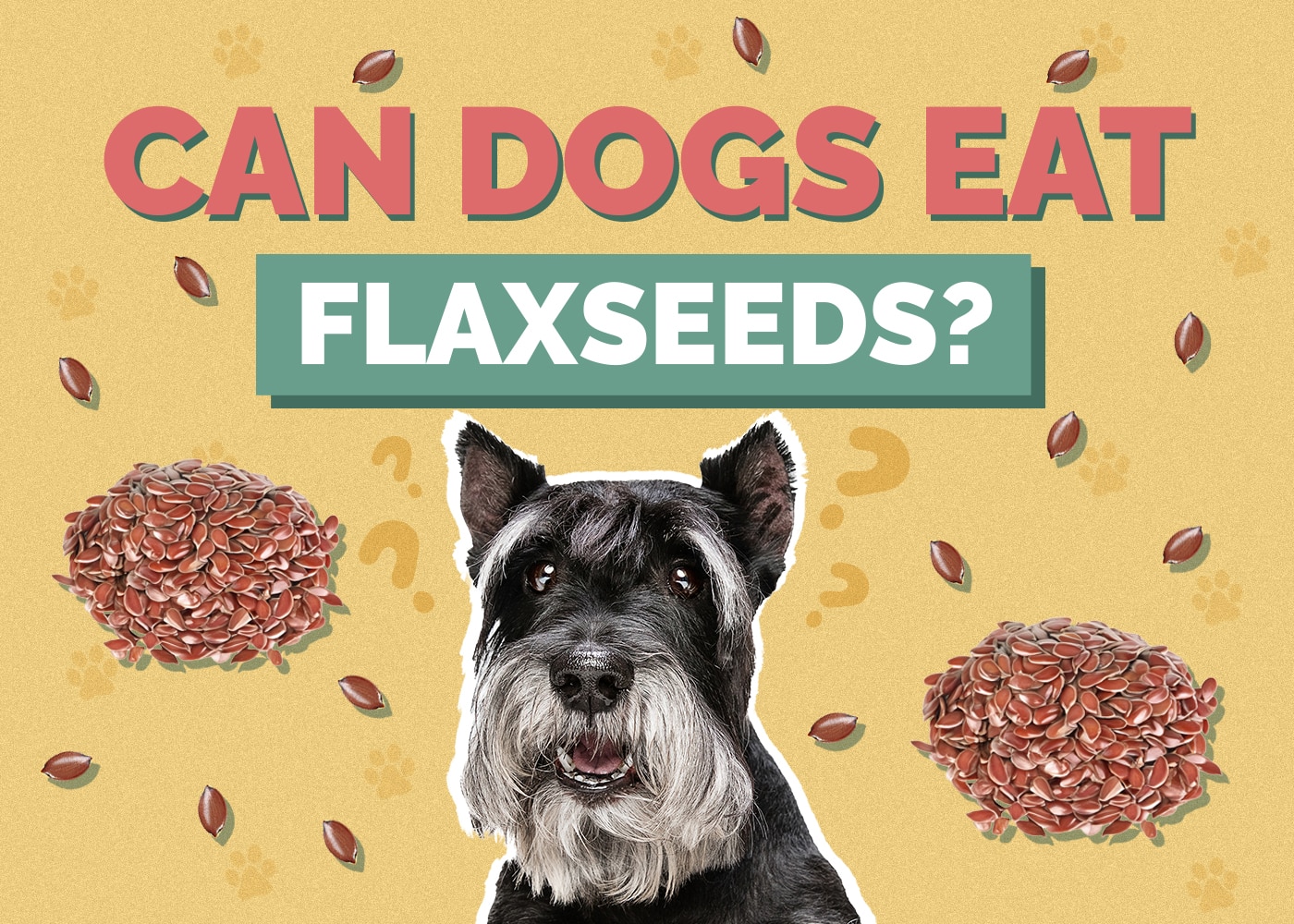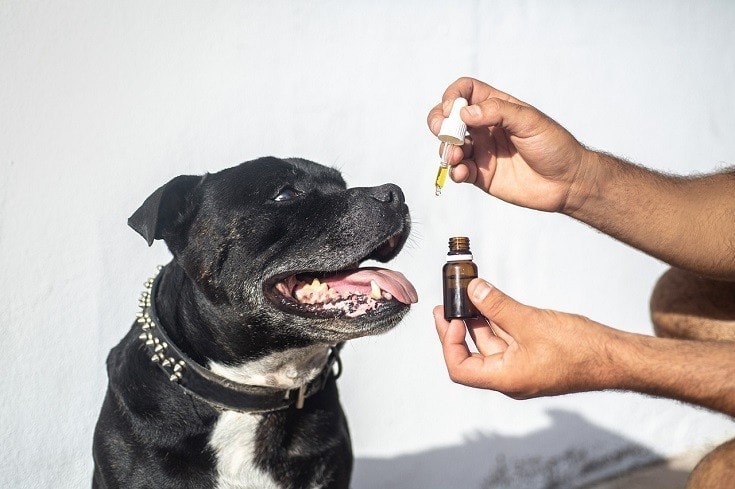Can Dogs Eat Flaxseed? Vet-Reviewed Nutrition Facts & FAQ
By Ashley Bates
Updated on

If you take your dog’s health seriously, you might have seen buzz in the natural foods world talking about the benefits of flaxseed for dogs. If you know very little about flaxseed, we want to point out that it’s even more beneficial to people.
Not only is it a great enhancement to add to your dog’s diet, but it also has a very, very large range of target health areas. We give flaxseed dogs a big thumbs up!
Always Check With Your Vet Before Introducing Flaxseed
Even though we’ve already told you that flaxseed is ultra beneficial for your canine companion, our word doesn’t trump your veterinarian’s. Several factors play into the supplements we’re allowed to give our canines.
Your vet will be able to assess your pet’s current health and their health history. Most healthy dogs should have the green light from your veterinarian, saying that they can absolutely indulge in the correct portions of this food item.
However, your vet might also have other recommendations and tips to consider before you make the change.

What Is Flaxseed?
Flax, or Linum usitatissimum, is a fibrous crop. Flaxseed is derived from the plant to add many benefits to the diet—for pets and people! When you shop for flaxseed, you might see it comes in two varieties: golden or brown.
Do golden or brown versions of flaxseed have any real differences? The only difference between the two of them is the taste. They have nearly identical nutrition within, but golden flaxseed tends to be a little lighter in taste, while brown flaxseed has a bolder flavor.
Realistically, if you mix the flaxseed in with your dog’s meals, they won’t taste much of the difference.
Do You Have to Buy Special Flaxseed for Dogs?
Several flaxseed options on the market are targeted towards canines specifically. However, if you prepare flaxseed correctly, you can buy any organic selection you choose. Flaxseed is better digested when grinded.

Different Types of Flaxseed for Dogs
- Flaxseed: The seed form of flaxseed is what you will see in most stores. It is a plain seed that you must prepare at home for consumption. You can buy flaxseed as a whole or ground seed.
- Flaxseed Oil: Since flaxseed contains a lot of oil, flaxseed oil is derived from excreting this out of the seed itself.
- Supplements: There are several flaxseed dog supplements on the market. They are sometimes stand-alone or built-in in combination with many other nutrients to target specific areas of health.
- Chews: Chews are designed to be a tasty snack, but also give your dog all of the nutritional benefits of flaxseed.
Nutrients in Flaxseed
Before you give your dog flaxseed, you should know what it offers your pup. Here are some excellent ingredients you can expect.
- Thiamine: Thiamine is part of the B complex vitamins, and it helps your dog strengthen their nervous system.
- Fiber: The most obvious part of flaxseeds is the fiber content. It will help your dog stay completely regular, having perfect stools rather than being too loose or too challenging to pass.
- Manganese: Manganese plays an important role in many enzymatic processes in your dog’s body. These processes include the synthesis of sex hormones, connective tissue, and bone. It also plays a role in calcium absorption and keeping blood sugar under control.
- Phosphorus: Phosphorus helps the tissues and cells grow and repair themselves. It is also essential in balancing out other vitamins and minerals in the body.
- Selenium: Selenium will help your dog’s maintain a healthy thyroid function and hormone metabolism.
- Zinc: Zinc is a vital mineral essential for several endocrine functions throughout the bodily systems. It helps maintain healthy immunity, reduces inflammation, and has antioxidant properties.
- Copper: When balanced with zinc, copper has antioxidant properties.
- Iron: Iron is a vital mineral in your dog’s body that is responsible for growth and development. Bodies also require iron to renew the red blood cells and prevent anemia.
Health Benefits of Flaxseed for Dogs

Hearing about the benefits of flaxseed for dogs is probably what sent you on the hunt for more information in the first place. Perhaps you have a friend or family member that gives flax to their dog.
Maybe you saw a TikTok video or heard a vet talking about the benefits. Regardless of your reason, there certainly are plenty of health benefits of flaxseed for our canine companions. Here are just a few.
Boosts Immunity
Because flaxseed is a rich source of omega fatty acids, more specifically, they are a source of ALA, an essential fatty acid that dogs need to ingest in their diet. Unlike cats, dogs can convert some ALA into EPA and DHA, which are well-researched and valued for their anti-inflammatory, immune-boosting, and neural function properties.
Contains Antioxidants
Flaxseed contains lots of antioxidants that rid free radicals in the body. Some examples of this include lignins, which are anti-antioxidants that have been researched because they seem to slow tumoral growth in rats.

Reduce Certain Disease Risks
Flaxseed is excellent for reducing the risk of certain illnesses and diseases. ALA, for example, can lower your dog’s risk of developing cardiovascular issues.
Excellent for Digestion
One of the most popular benefits you have probably heard about flaxseed for dogs is the benefit it has for the digestive system. It helps your dog’s gastrointestinal tract, eliminating constipation and diarrhea to promote a healthy flow.
Skin & Coat Improvement
In addition to aiding in digestion, flaxseed is an excellent component to improve skin and coat health. Flaxseed contains lots of omega fatty acids, which is directly beneficial to these two areas. If given topically, flaxseed enhances a dog’s skin and coat in just 14 short days.
Downfalls of Flaxseed for Dogs

As with all upsides, there are some downsides to flaxseeds for dogs as well. First is that flaxseed can spoil. If you do not refrigerate ground flaxseed appropriately, it can go bad. If you feed bad flaxseed to your dog, it can cause diarrhea and other gastrointestinal manifestations.
Patients taking anticoagulants, blood pressure medications, or insulin may have a problem with flaxseed due to potential interaction. Make sure to enumerate to your vet all the medications of your pet including vitamins, other supplements and herbal medicine, if you want to incorporate flaxseed to your dog’s diet.
Adding flaxseed to your dog’s diet can initially cause gas, loose stool, or diarrhea until your dog is used to it. Keep this in mind and understand that accidents on your carpet might not be your dog’s fault at all. You also want to ensure you do not abuse the amount of flaxseed added to supplement your dog’s diet. After all, it is very rich in fiber.
As with anything else, organic flaxseed is always better than regular flaxseed, which might have added chemical compounds in their growth or processing. So, keep in mind that labels matter.
Final Thoughts About Flaxseed for Dogs
As you can see, flaxseed is an extremely valuable food item to add to your dog’s standard diet. You should always ensure you’re giving the correct portions and check with your veterinarian before changing your dog’s diet.
Remember that you can buy flaxseed in several different forms, whether it be the flaxseed itself, flaxseed oil, supplements, or dog treats. Shop around or visit your local supermarket to purchase this superfood.
See Also:
- Can Dogs Eat Sesame Seeds? Nutrition Facts & Safety Guide
- Can Dogs Have Pumpkin Seeds? Nutrition Facts & Safety Guide
Featured Image: Pixabay















